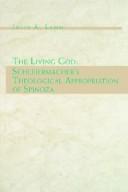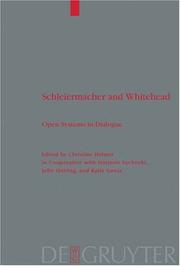| Listing 1 - 10 of 12 | << page >> |
Sort by
|

ISBN: 0271015403 Year: 1996 Publisher: University Park, Pa. : Pennsylvania State University Press,
Abstract | Keywords | Export | Availability | Bookmark
 Loading...
Loading...Choose an application
- Reference Manager
- EndNote
- RefWorks (Direct export to RefWorks)
God --- Philosophical theology --- Dieu --- Théologie philosophique --- History of doctrines --- Histoire des doctrines --- Schleiermacher, Friedrich, --- Spinoza, Benedictus de, --- Kant, Immanuel, --- Contributions in doctrine of God. --- Influence. --- -God --- -Metaphysics --- Misotheism --- Monotheism --- Religion --- Theism --- -History of doctrines --- -Kant, Immanuel --- -Spinoza, Benedictus de --- -Schleiermacher, Friedrich --- -Influence --- Influence --- Contributions in doctrine of God --- Théologie philosophique --- God (Christianity) --- Christianity --- Trinity --- Ispīnūzā, --- Spinoza, Baruch, --- Espinoza, Baruch d', --- Sbīnūzā, --- Espinosa, Baruch de, --- De Spinoza, Benedictus, --- Shpinozah, --- Shpinozah, Barukh, --- Spinoza, Benedict de, --- Spinoza, Barukh, --- Spinoza, Baruch de, --- Spinoza, Benoît de, --- ספינאזא, ברוך דע --- ספינאזא, ברוך, --- שפימוזה, ברוך --- שפינאזא, בענעדיקט --- שפינאזא, ברוך --- שפינאזע, ברוך --- שפינוזא, בנדיקטוס --- שפינוזהת ברוך, --- שפינוזה, ברוך --- שפינוזה, ברוך די, --- שפינוזה, ברוך, --- שפינוזה, ב. --- سبينوزا، بندكتس --- Schleiermacher, Friedrich Ernst Daniel --- Schleiermacher, Friedrich --- Schleiermacher, Friedrich Daniel Ernst --- Kant, Emmanuel --- Kant, Emanuel --- Kant, Emanuele --- Kant, Immanuel --- Schleiermacher, Friedrich Daniel Ernst. --- Kant, I. --- Kānt, ʻAmmānūʼīl, --- Kant, Immanouel, --- Kant, Immanuil, --- Kʻantʻŭ, --- Kant, --- Kant, Emmanuel, --- Ḳanṭ, ʻImanuʼel, --- Kant, E., --- Kant, Emanuel, --- Cantơ, I., --- Kant, Emanuele, --- Kant, Im. --- קאנט --- קאנט, א. --- קאנט, עמנואל --- קאנט, עמנואל, --- קאנט, ע. --- קנט --- קנט, עמנואל --- קנט, עמנואל, --- كانت ، ايمانوئل --- كنت، إمانويل، --- カントイマニユエル, --- Kangde, --- 康德, --- Kanṭ, Īmānwīl, --- كانط، إيمانويل --- Kant, Manuel, --- de Spinoza, Benedictus --- Spinoza, Benedictus de --- Spinoza, Baruch --- Spinoza, Benedict de
Book
ISBN: 9781119283508 1119283507 9781444332865 Year: 2013 Publisher: Malden, Mass. Wiley-Blackwell
Abstract | Keywords | Export | Availability | Bookmark
 Loading...
Loading...Choose an application
- Reference Manager
- EndNote
- RefWorks (Direct export to RefWorks)
248 --- 248 Spiritualite. Ascese. Mystique. Theologie ascetique et mystique. Devotion --- 248 Spiritualiteit. Ascese. Mystiek. Vroomheid --- Spiritualite. Ascese. Mystique. Theologie ascetique et mystique. Devotion --- Spiritualiteit. Ascese. Mystiek. Vroomheid --- Mysticism --- Dark night of the soul --- Mystical theology --- Theology, Mystical --- Spiritual life --- Negative theology --- Christian spirituality --- Mysticism. --- 248 Spirituality. Ascesis. Mystic. Piety --- Spirituality. Ascesis. Mystic. Piety
Book
ISBN: 9783110694895 9783110695069 Year: 2021 Publisher: Boston : De Gruyter,
Abstract | Keywords | Export | Availability | Bookmark
 Loading...
Loading...Choose an application
- Reference Manager
- EndNote
- RefWorks (Direct export to RefWorks)
Friedrich Schleiermacher’s Platons Werke (1804–28) changed how we understand Plato. His translation of Plato’s dialogues remained the authoritative one in the German-speaking world for two hundred years, but it was his interpretation of Plato and the Platonic corpus, set forth in his Introductions to the dialogues, that proved so revolutionary for classicists and philosophers worldwide. Schleiermacher created a Platonic question for the modern world. Yet, in Schleiermacher studies, surprisingly little is known about Schleiermacher’s deep engagement with Plato.Schleiermacher’s Plato is the first book-length study of the topic. It addresses two basic questions: How did Schleiermacher understand Plato? In what ways was Schleiermacher’s own thought influenced by Plato? Lamm argues that Schleiermacher’s thought was profoundly influenced by Plato, or rather by his rather distinctive understanding of Plato. This is true not only of Schleiermacher’s philosophy (Hermeneutics, Dialectics) but also of his thinking about religion and Christian faith during the first decade of the nineteenth century (Christmas Dialogue, Speeches on Religion). Schleiermacher’s Plato should be of interest to classicists, philosophers, theologians, and scholars of religion.6
Philosophy, Ancient --- Platon. --- Platonismus. --- Schleiermacher, Friedrich. --- Philosophie de la religion --- Théologie philosophique --- Schleiermacher, Friedrich Daniel Ernst --- Platon --- Plato.
Book
ISBN: 9780824599911 9780824599928 9780824599935 9780824599942 Year: 2019 Publisher: New York, N.Y. The Crossroad Publishing Company
Abstract | Keywords | Export | Availability | Bookmark
 Loading...
Loading...Choose an application
- Reference Manager
- EndNote
- RefWorks (Direct export to RefWorks)
Digital
ISBN: 9783110695069 9783110695168 9783110694895 Year: 2021 Publisher: Berlin ;; Boston De Gruyter
Abstract | Keywords | Export | Availability | Bookmark
 Loading...
Loading...Choose an application
- Reference Manager
- EndNote
- RefWorks (Direct export to RefWorks)
Book
ISBN: 1587683660 0809106078 9780809106073 0809148781 9780809148783 9781587683664 Year: 2014 Publisher: Mahwah, New Jersey
Abstract | Keywords | Export | Availability | Bookmark
 Loading...
Loading...Choose an application
- Reference Manager
- EndNote
- RefWorks (Direct export to RefWorks)
Spirituality --- Christianity. --- Schleiermacher, Friedrich,


ISBN: 9783110899658 9783110179927 Year: 2012 Publisher: Berlin ;; Boston De Gruyter
Abstract | Keywords | Export | Availability | Bookmark
 Loading...
Loading...Choose an application
- Reference Manager
- EndNote
- RefWorks (Direct export to RefWorks)


ISBN: 0878406468 Year: 1997 Publisher: Washington Georgetown university press
Abstract | Keywords | Export | Availability | Bookmark
 Loading...
Loading...Choose an application
- Reference Manager
- EndNote
- RefWorks (Direct export to RefWorks)
"Evangelium Vitae", or "The Gospel of Life", Pope John Paul II's 1995 encyclical, addresses practical moral questions that touch on the sacredness of human life: abortion, euthanasia and assisted suicide, and capital punishment. Tackling major moral and cultural ideas, the Pope urged "all men and women of good will" to embrace a "culture of life" instead of the prevailing "culture of death". In this book, scholars from a wide range of disciplines - law, medicine, philosophy, and theology - and various religious perspectives discuss and interpret the Pope's teachings on these complex moral issues. The opening essays establish a context for the encyclical in the moral thought of John Paul II and examine issues of methodology and ecclesiology. A second group considers the themes of law and technology, which are crucial to the way the encyclical views the specific matters of life and death. The final section turns to the specific topics of abortion, euthanasia, assisted suicide, medical experimentation, and capital punishment. Seeking to promote discussion between the ideas of the encyclical and other points of view, this volume does not attempt to endorse "Evangelium Vitae" but rather to illustrate its relevance to both private choice and public policy. It will serve as a foundation for further dialogue and allow others to approach the pontiff's thought with new awareness and insight.
Abortion --- Capital punishment --- Euthanasia --- Religious aspects --- Catholic Church --- Catholic Church. --- Doctrines.
Book

ISBN: 9783110216349 Year: 2010 Publisher: Berlin Boston
Abstract | Keywords | Export | Availability | Bookmark
 Loading...
Loading...Choose an application
- Reference Manager
- EndNote
- RefWorks (Direct export to RefWorks)
Digital

ISBN: 9783110216349 9783110216332 Year: 2010 Publisher: Berlin ;; Boston De Gruyter
Abstract | Keywords | Export | Availability | Bookmark
 Loading...
Loading...Choose an application
- Reference Manager
- EndNote
- RefWorks (Direct export to RefWorks)
| Listing 1 - 10 of 12 | << page >> |
Sort by
|

 Search
Search Feedback
Feedback About UniCat
About UniCat  Help
Help News
News